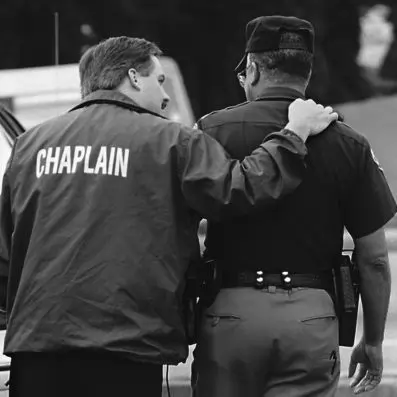Why Chaplaincy?
The good news? The law enforcement culture is having unprecedented discussions regarding resiliency. The bad news? There are a number of obstacles needing addressed that the message may reach those who need it most. The great news? There exists a special group of public servants that can help make a tremendous difference in the effort: law enforcement chaplains!

A Special Encourager of Humanity
To some, the word chaplain conjures up images of force-fed spirituality, but others, having benefitted from their service, know that not to be their experience. A chaplain, at its base level, is a special encourager of humanity, someone with life experience and a neutral perspective that can advise when life’s challenges visit.
America’s first chaplain was a Mr. Jacob Duche, who, as the storm clouds of war and civil turmoil gathered in 1774, provided that first prayer of encouragement in the Continental Congress. Of that prayer John Adams would later write, ”I never saw a greater effect upon an audience; (it) filled the bosom of every man present.“
The encyclopedia Britannica attributes the origin of the term chaplain to the 4th century and lists the Emperor Charlemagne as employing chaplains in “direct service to the monarch as advisers in both ecclesiastical and secular matters.”
This dual purpose continues in our day. Chaplains are experts in ecclesiastical matters to those inquiring but serve an invaluable secular purpose as well. Properly trained law enforcement chaplains receive a broad spectrum of secular training on such topics as Critical Incident Stress Debriefing, Suicide Prevention, Understanding/Addressing the Unique Challenges of the Law Enforcement Family, Responding to a Crisis, and Understanding of Proper Church-State Relations, to name a few.
Chaplains are uniquely suited to address many of the greatest challenges to effectively communicating resiliency within the law enforcement culture.
- They can help the profession better understand its tendency to be reactive rather than proactive. Years of being dispatched to calls, held over for reports, called in for training, called out for specialty units, subpoenaed to court. Habits of reacting rather than proactively addressing life’s challenges can be the norm at work and at home. This attitude can carry over into leadership. Considering 32% of all police suicides involve relationships (Violante, 2005), volunteer chaplains can help spearhead innovative programs that help train new hires and spouses to work as a team to combat all that is coming their way before it becomes a major crisis!
- Given leaders can be prone to assume reactive attitudes toward resiliency, many have a tendency to look to mental health professionals as a first line of defense after challenges arise. The reality is most officers will not trust those they do not know. Unless mental health professionals are embedded in a department and have built the necessary relationships, their ability to win the trust of officers can be greatly hampered. This reality is compounded for smaller departments who are unable to afford mental health professionals in the first place. Properly trained volunteer law enforcement chaplains can invest the time needed to build quality relationships that foster an environment of trust. Spending time with officers doing ride-alongs, getting to know officers and their families, walking with them through critical incidents, and demonstrating confidentiality can enable this trust to blossom.
- Chaplains can help build an environment that removes stigma by normalizing wellness practices through a reform of the terms used to encourage their need. A cursory internet search of news articles quoting law enforcement professionals and others addressing critical incidents included language such as take that step, come forward, get help; someone who is having mental issues should not be given a gun; or they should seek treatment if they’re experiencing problems with mental health. This phraseology, although intended to encourage officers to reach out, often has the opposite effect. Officers won’t respond for fear of looking weak or concern that doing so will jeopardize their ability to carry a gun or maintain their police powers. Chaplains can help herald the fact that officers are not mentally defective because of what they see. They are normal human beings doing an abnormal job. A 2015 study (Chopko, Palmieri and Adams) stated that the average officer of a mid-sized agency experiences 188 critical incidents during their career, any one of which could incapacitate the average member of the community. Experiencing the evil done by those who are supposed to care, victimized children, abuse of the elderly, hopelessness, and gruesome death scenes should bother a normal human. It’s something that takes time to process. Training the next generation of officers to understand that it’s okay will do much to keep officers in the fight.
- Present resiliency in ways that help officers understand that although they can’t control what happened to them, they can glean new battle skills that will make them even more effective! Chaplains can share life experience as to how hardship and bad experiences, even though difficult for a season, can help officers to be more compassionate as well as forge their character. Chaplains can present resiliency in creative packages that get an officer’s attention to be seen as strength.
The International Conference of Police Chaplains sets the industry standard for the training of law enforcement chaplains worldwide. We are honored to support America’s front-line heroes and their families. Please contact us for more info on starting a chaplaincy program, receiving training, or utilizing creative ways to communicate resiliency with officers and their spouses and significant others.

